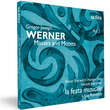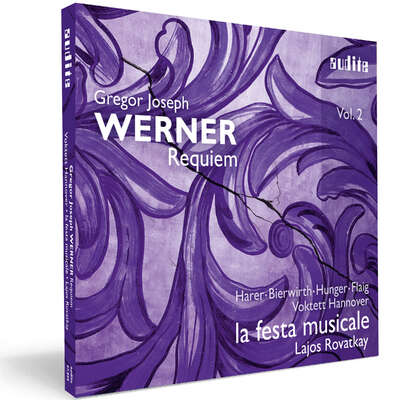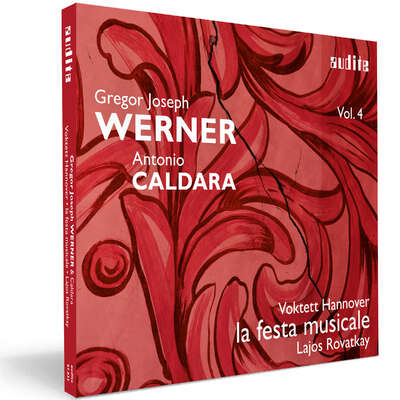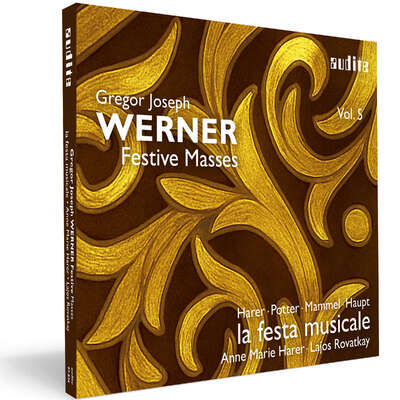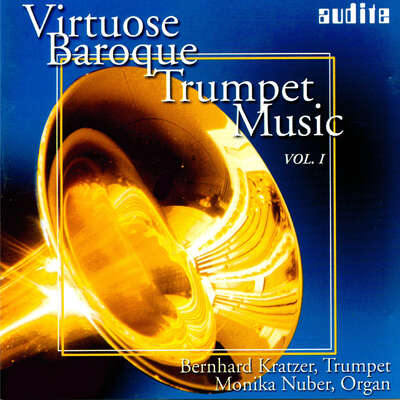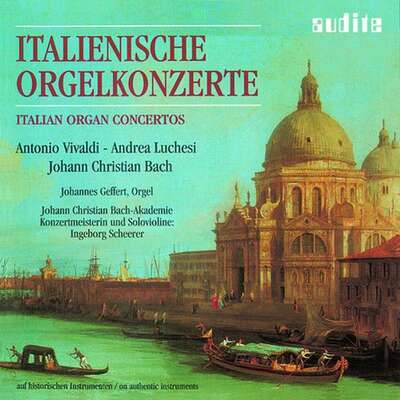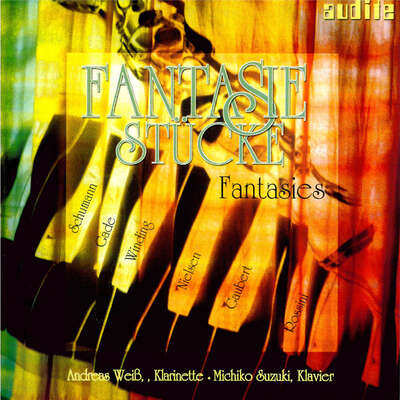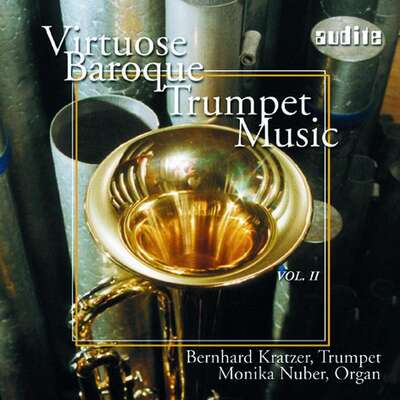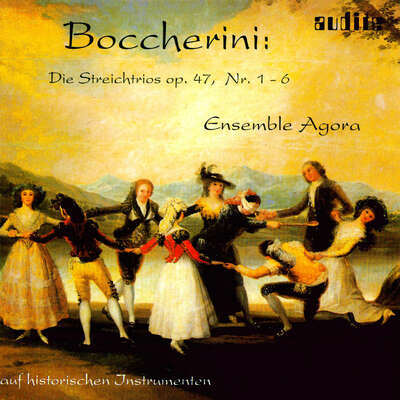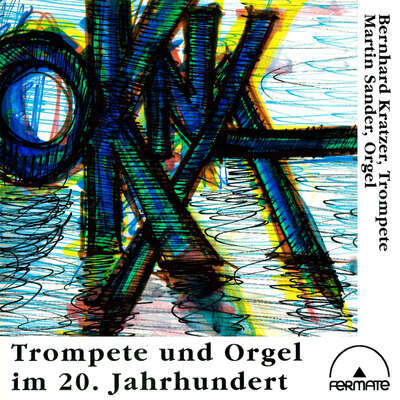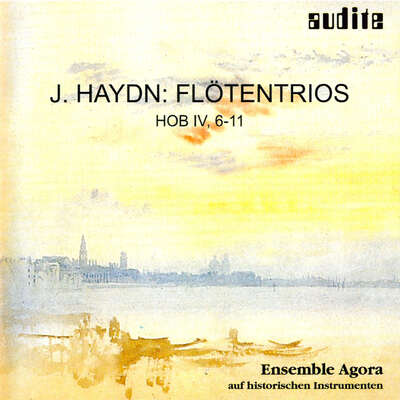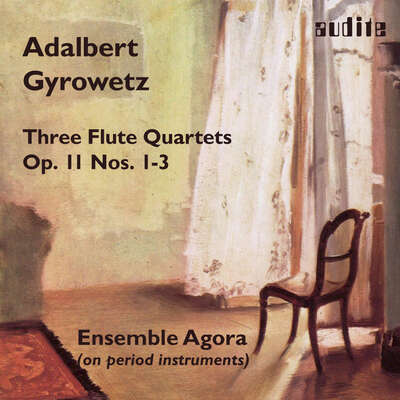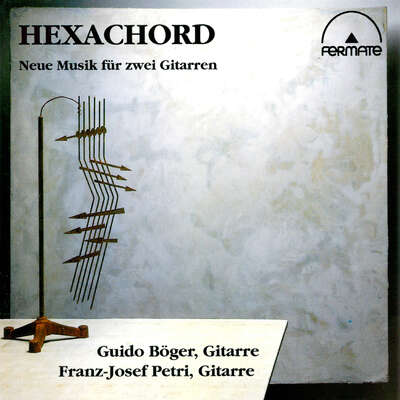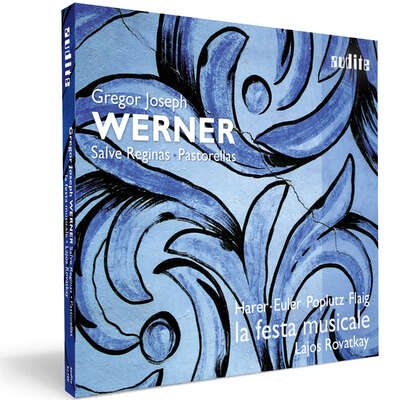
Gregor Joseph Werner’s masses and motets consolidate the greatest contrasts imaginable between instrumental brilliance and vocal polyphonic richness. The composer was also the last great master of Palestrina’s stile antico: Werner’s special trump card.more
Voktett Hannover | la festa musicale
Lajos Rovatkay
"The artistic and aesthetic realization of this program is [...] beyond any doubt. Rovatkay always finds the right intonation that most perfectly brings together the music, the text and the expression of religious feeling." (Pizzicato)
Track List
This bonus track is only available as a download!
Details
| Gregor Joseph Werner: Vol. III: Masses and Motets | |
| article number: | 97.819 |
|---|---|
| EAN barcode: | 4022143978196 |
| price group: | BCA |
| release date: | 3. November 2023 |
| total time: | 75 min. |
Bonus Material
Informationen
An impressive continuation of the documentation of Gregor Joseph Werner's oeuvre, showing Haydn's predecessor at the Esterházy court as a pioneer in musical development.
Gregor Joseph Werner was by no means a mere minor master preceding Haydn - this was already impressively shown by the previous recordings in this series. Now the newly acquired picture of him is put into even sharper focus: Werner's symphonies and instrumental concertos composed for the princely table have been lost, but the composer comes to the fore as a grand master of Latin sacred music. With his strength of character and contrapuntal perfection, he proves to be not only a prerequisite and teacher for Joseph Haydn, the father of Viennese classicism, but himself a gateway to this stylistic epoch. Werner appears to us today as the spiritual support of the rather mundane Viennese classicism.
The mass settings recorded here need not fear any comparison with Haydn's, Mozart's and Schubert's smaller and mid-scale masses. They consolidate the greatest contrasts imaginable between instrumental brilliance and vocal polyphonic richness. The composer was also the last great master of Palestrina's stile antico. The way he updated the imitation technique in the motet, which was already two hundred years old at the time, by increasing dissonance reveals a hidden power in the development of Western composition.
Reviews
Zeitzeichen | 4/2024 | Reinhard Mawick | April 1, 2024 | source: https://zeitzeic...
Preisgekrönt
Sensationelle Wiederentdeckung
Kennen Sie Gregor Joseph Werner? Nie gehört? Macht nichts. Das ging mir auch so, bis vor ein paar Jahren war dieser Werner ein Phantom. Dann aberMehr lesen
Lajos Rovatkay? Der ist nun alles andere als ein Phantom, selbst wenn sein Name über die Grenzen Hannovers hinaus meist nur Kennerinnen und Eingeweihten bekannt ist. Der Cembalist, Ensembleleiter und Musikpädagoge, ein gebürtiger Ungar, floh 1956 vor den Kommunisten nach Deutschland und spielte dann eine profunde Rolle bei der Implantierung der Alten Musik hierzulande: Seit 1962 unterrichtete er Orgel und Cembalo an der Musikhochschule Hannover und von 1975 bis zu seiner Pensionierung 1998 leitete er das dortige Studio für Alte Musik. So prägte Rovatkay Generationen von Musiker:innen auf dem Gebiet der historischen Aufführungspraxis. Gleichzeitig ist er selbst ein Forscher und Entdecker par excellence. Nur ein Beispiel: 1989 führte er anlässlich des 300-jährigen Opernjubiläums in Hannover die Oper „Enrico Leone“ des italienischen Barockkünstlers Agostino Steffani (1654–1728) auf, der einige Jahre in Hannover gewirkt hatte und dessen opulentes Werk Rovatkay in Archiven gefunden hatte.
Nun ist der Schatzsucher auf einen neuen Künstler gestoßen, eben besagten Gregor Joseph Werner. Der Österreicher (1693–1766) verbindet in seinem Werk Barock und Klassik auf sehr kunstvolle und schöne Weise. Rovatkay hat nun zusammen mit versierten Solisten und dem achtköpfigen Voktett, einem erlesenen achtköpfigen Vokalensemble junger Sänger:innen aus Hannover, und dem Barockorchester La festa musicale Messen und Motetten Werners eingespielt. Er war übrigens Vorgänger von Joseph Haydn als Hofkapellmeister beim Fürsten Esterházy in Eisenstadt. Werners Werke sind von erlesener Schönheit. Sie vereinen kunstvollst die Strenge barocken Kontrapunkts mit Melodik und Harmonik, die bereits an die Wiener Klassik erinnert. Ohne Frage eine lohnende Entdeckung!
Nach der nunmehr dritten CD mit Werken von Gregor Joseph Werner, die Rovatkay mit den Seinen veröffentlichte, hat es auch die Fachwelt gemerkt und die Silberscheibe mit dem Preis der Deutschen Schallplattenkritik ausgezeichnet. Dieser Preis trifft die Richtigen: Denn selten hat man so wunderschöne, ausgewogene Gesangsleistungen gehört – sowohl in den Soli wie auch im Tutti. Und dieser Preis trifft besonders den Richtigen: Sollten Sie sich gewundert haben, dass Lajos Rovatkay bereits 1998 pensioniert wurde, so liegt das schlicht daran, dass der überaus rüstige Künstler, Jahrgang 1933, im vergangenen September seinen 90. Geburtstag (!) feierte – natürlich mit einem selbstgespielten Orgelkonzert. Da kann man nur hoffen: Ad multos annos!
ET SONA - HIFI & MÚSICA | 29.03.2024 | Fernando Alday | March 29, 2024 | source: https://www.et-s...
Cortesía de la casa Audite, reconocida firma de grabaciones de extraordinaria calidad, tenemos el placer de recibir para reseña esta magníficaMehr lesen
Audite nace, en su forma actual, de la fusión de 2 sellos discográficos con especial atención a la grabación: Audite y Fermate. Los cuales decidieron unirse allá por el año 2000. Sus líderes, Friedrich Mauermann y Ludger Böckenhoff, ambos ingenieros de sonido, combinaron experiencia y pasión para crear algo realmente especial. Actualmente, Böckenhoff es el alma de Audite, poniendo a su disposición toda su experiencia y arte en el ámbito de la grabación musical, así como una gran pasión por publicar material de extraordinaria calidad.
Con un catálogo que abarca desde música medieval hasta la contemporánea, el amplio catálogo y la calidad de sus trabajos ha hecho de Audite, un sello altamente reconocido por melómanos y audiófilos y una referencia en la grabación, edición y producción de música clásica. Por hacernos una idea, Audite ha recibido, a la fecha, once premios ICMA (International Classical Music Awards) por sus producciones.
La producción que nos ocupa es el Volumen III de una excelente compilación del compositor Gregor Joseph Werner. En este volumen se agrupan sus Masses & Motets, es decir, se trata de un conjunto de grabaciones corales polifónicas, donde varias voces cantan a la vez con o sin acompañamiento musical instrumental. Habrá que apuntar además que, gracias a la gran experiencia y habilidad técnica de Audite, en la obra que nos ocupa lo hacen con una calidad de grabación impresionante.
Cabe mencionar que la presente grabación fue seleccionada en la prestigiosa lista I/2024 de la Asociación de Críticos de Discos Alemanes. (German Records Critics Award). Por lo que no hace falta que se fíen únicamente de lo que yo escribo en estas líneas con respecto a la misma.
La compilación contiene múltiples interpretaciones de música eclesiástica, cantada en coro y con un acompañamiento instrumental sorprendente. Se trata de un trabajo histórico de publicación y conservación de el trabajo de Werner. Para muestra, os dejo un pequeño vídeo donde se representa parte de la interpretación.
En referencia al autor, Gregor Joseph Werner fue un músico y compositor austriaco del periodo barroco, muchas veces recordado, más que por su prolífica composición, por su relación con Joseph Haydn. Lamentablemente, su obra ha caído en una etapa muy oscura, con poquísimas ediciones de su obra realizándose, por lo que el esfuerzo de Audite resulta doblemente loable.
Se encuentra disponible en formato físico en CD y como descarga digital en la página de Audite. Mi más profundo agradecimiento a Audite, que me ha facilitado el material para su escucha y disfrute. Por favor, visitar la página, ya que ofrecen, incluso, descargas gratuitas de excelente música instrumental y clásica para el deleite de todos los melómanos.
Preis der Deutschen Schallplattenkritik | 15.02.2024 Bestenliste I/2024 | Carsten Niemann | February 15, 2024 | source: https://www.scha... Bestenliste 1/2024
Früher Haydn mag interessant sein, aber ein gleichwertiges Vergnügen ist es, das reife Werk seines Vorgängers am Hofe Esterházy zu entdecken. InMehr lesen
Bayerischer Rundfunk | 11.02.2024 "Tafel-Confect", 12:05 Uhr | Dirk Kruse | February 11, 2024 | source: https://www.br-k...
BROADCAST: Kostprobe
Meister der Messe. Gregor Joseph Werner, Haydns Vorgänger auf Schloss Esterhazy, glänzt mit geistlicher Musik
Gregor Joseph Werner, dem Joseph Haydn als Kapellmeister bei den EsterhazysMehr lesen
Classica – le meilleur de la musique classique & de la hi-fi | N° 259 - Février 2024 | Marc Vignal | February 1, 2024
La polyphonie est belle, bien servie par le Voktett Hannover (octuor vocal) et les solistes vocaux savent briller. [...] Ce troisième volume d’une belle série consacrée à Werner appelle une suite.Mehr lesen
klassik.com | 28.11.2023 | Dr. Matthias Lange | November 28, 2023 | source: https://magazin.... Später Kontrapunkt
La festa musicale [...] agiert [...] klangsensibel, farbenreich, dazu flexibel und virtuos, auf technisch bezwingender Basis [...] Die Werner-Reihe schreitet voran – mit hoher Qualität in Komposition wie Interpretation.Mehr lesen
De Gelderlander | 15-11-23 | Maarten-Jan Dongelmans | November 15, 2023 | source: https://www.geld... Gedreven paladijnen serveren heerlijke cocktail
Rovatkay en zijn musici maken er het hoogtepunt van dit album én van de serie tot nu toe van. Een speciaal woord van waardering voor de coloratuursopraan Magdalena Harer. Zoals zij haar partij zingt: een belevenis.Mehr lesen
Kulturabdruck | 4. November 2023 | Dr. Thorsten Stegemann | November 4, 2023 | source: https://www.kult... Nach den Wolken die Sonne
[...] seine Werke [bestechen] durch handwerkliche Meisterschaft und eine selten facettenreiche Erfindungsgabe. Zu einem [„tiefgreifenden musikalischen Erlebnis“] werden die Werke des unbekannten Weltmeisters vollends durch die herausragende Interpretation, die sie auf dieser CD erfahren.Mehr lesen
www.pizzicato.lu | 02/11/2023 | Norbert Tischer | November 2, 2023 | source: https://www.pizz...
audite setzt seine Reihe mit Werken von Gregor Joseph Werner (1695-1766) mit Messen und Motetten fort. Lajos Rovatkay dirigiert sorgfältig, um dasMehr lesen
Das Solistenquartett ist homogen, wenn auch die Sopranistin Magdalene Harer mit ihrer warm leuchtenden Stimme besonders überzeugt. Exzellent, wie schon in vorigen Einspielungen ist auch das Voktett Hannover.
Die künstlerische und ästhetische Umsetzung dieses Programms ist also über jeden Zweifel erhaben. Rovatkay findet immer die richtige Intonation, die die Musik, den Text und den Ausdruck des religiösen Gefühls am perfektesten zusammenbringt.
English translation:
audite continues its series of masses and motets with works by Gregor Joseph Werner (1695-1766). Lajos Rovatkay conducts carefully to exploit the compositional sophistication of the music and its expressive possibilities at the right level. His ensemble la festa musicale performs in a relaxed style and expression that favors spirituality over affect. Werner speaks an internalized language in the pieces performed here that gives a great place to meditation, both musical and spiritual. Indeed, one must not forget that all these works were functional liturgical music.
The quartet of soloists is homogeneous, although soprano Magdalene Harer is particularly convincing with her warmly luminous voice. Excellent, as in previous recordings, is also the Voktett Hannover.
The artistic and aesthetic realization of this program is thus beyond any doubt. Rovatkay always finds the right intonation that most perfectly brings together the music, the text and the expression of religious feeling.
www.musicweb-international.com | OCTOBER 29, 2023 | Johan van Veen | October 29, 2023 | source: https://www.musi...
The disc to be reviewed here is the third volume in a project devoted to the oeuvre of Gregor Joseph Werner. He is pretty well-known, but mainly asMehr lesen
Werner was born in Ybbs an der Donau, and started his career as an organist at Melk Abbey. He married in Vienna, where, according to the traditional view, he may have been a pupil of Johann Joseph Fux. However, Lajos Rovatkay believes there are good reasons to assume that it was rather Antonio Caldara who was his teacher. In 1728 he was appointed Kapellmeister at Esterházy. Just like German aristocrats of the late 17th century were impressed by the splendour of the French court under Louis XIV and aimed at imitating that at their own courts, their peers of the mid-18th century wanted to imitate the splendour of the imperial court in Vienna. Werner was selected with the purpose of creating something similar in Esterházy.
It is mostly impossible to date Werner’s works and therefore it is impossible to follow his stylistic development. “Werner’s dated works show that he already made use of all his progressive harmonic expressive colours shortly after his appointment as Kapellmeister at the Esterházy court in Eisenstadt (1728) (…) and also revealed himself as a great contrapuntal master”, Lajos Rovatkay states in his liner-notes.
The two masses consist of the usual sections: Kyrie, Gloria, Credo, Sanctus – Benedictus and Agnus Dei. All of them are divided into sections for tutti and for one to four solo voices. The instrumental accompaniment is very modest: two violins and basso continuo. The violins often play a substantial role, more than just an accompaniment. In the ‘Laudamus te’ from the Missa Sunt bona mixta malis the organ plays an obbligato part. This is a solo for soprano, and so are ‘Quoniam tu solus sanctus’ (Gloria) and Pleni sunt coeli’ (Sanctus). The soprano solos are the most technically demanding; in comparison, the only tenor solo (Benedictus) is rather modest. In this mass the Kyrie is a single section, and not divided into three. Likewise, the Crucifixus is not singled out, but part of the section which opens with ‘Et incarnatus est’. Werner shows his skills in counterpoint with several fugal episodes. It is not known why this mass has the title Sunt bona mixta malis (The good are mixed with the bad). Likewise, the idea behind the title of the other mass is unknown: Post nubila Phoebus – After the clouds, the sun. In this mass the Kyrie is split into three sections; the Christe eleison is a solo for bass. There are two solo sections for soprano: ‘Quoniam tu solus’ (Gloria) and – like in the other mass – ‘Pleni sunt coeli’ (Sanctus). The Domine Deus (Gloria) is a solo for tenor. In several sections, the soli and the tutti alternate. Notable is that here the Crucifixus is a separate section.
In these two masses Werner mixes the style of his time with the stile antico; Rovatkay notices that Werner stayed away from the ‘galant’ idiom that became fashionable in the course of his career. His sacred works have undoubtedly more depth than much that was written in his time. The four antiphons are masterpieces of counterpoint, and here the influence of the ‘old style’ of the Franco-Flemish school manifests itself. That said, Werner does not overlook the possibilities to use harmony for expressive reasons, such as in Alma redemptoris mater, on the closing words “peccatorum miserere”.
The harmonic progressions in the Sonata prima are remarkable. This work dates from 1735 and was written to welcome Prince Paul Anton Esterházy returning from his grand tour. It is written after the model of the Italian sonata da chiesa, with four movements.
Sometimes, when a musicologist or performer discovers a ‘forgotten master’, he is carried away and overstates the importance of his discovery. Lajos Rovatkay is clearly very enthusiastic about his discovery of Werner and rates him highly. Having heard the previous two recordings under his direction and some other performances, I agree with his assessment that Werner was a true master. The efforts to explore his oeuvre are well deserved, and I hope that we may expect more. If a hitherto hardly-known composer’s oeuvre is presented, it helps if the performances are really top-class. That is the case here. Given the important role of the soprano and the character of her part, Magdalene Harer deserves a special mention. She is a specialist in early music, and her voice is perfectly suited to this repertoire. She has no problems with the coloratura, thanks to the agility of her voice. The other three soloists are her equals, and all four of them blend perfectly in the many ensembles. Voktett Hannover is a fine vocal ensemble which produces a transparent sound, which is important in these largely polyphonic works. La festa musicale is the perfect partner for the instrumental parts.
If you have purchased the previous volumes, don’t hesitate to add this disc to your collection. It will give you much to enjoy and to admire. Let’s hope for more Werner.
